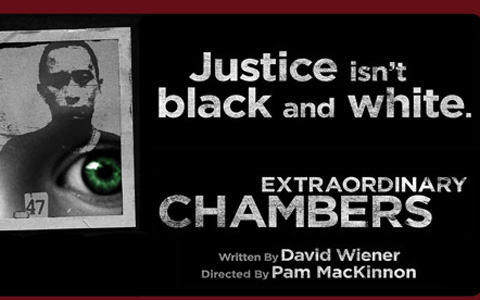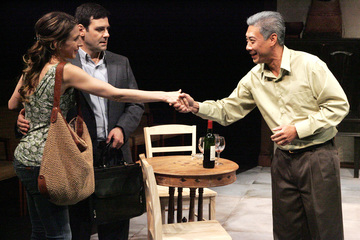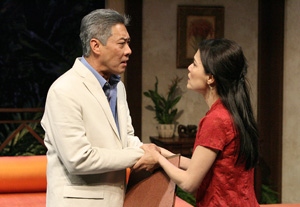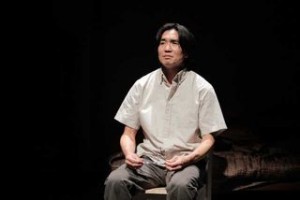 Expectations were high with Extraordinary Chambers, a play written by David Wiener and directed by Pam MacKinnon. Starring Francois Chau, Mather Zickel, Marin Hinkle, Greg Watanabe, and Kimiko Gelman, the play opened at the Geffen Playhouse on June 1st and ever since then I have been hearing rave reviews from fellow Asian American colleagues who have seen this show. But when it comes to theater, I usually discredit what I hear from anyone since critiques are not to be taken as word of gospel until you actually see it for yourself. So after a few weeks, I decided to finally check it out and watched the Saturday matinee performance before it closed.
Expectations were high with Extraordinary Chambers, a play written by David Wiener and directed by Pam MacKinnon. Starring Francois Chau, Mather Zickel, Marin Hinkle, Greg Watanabe, and Kimiko Gelman, the play opened at the Geffen Playhouse on June 1st and ever since then I have been hearing rave reviews from fellow Asian American colleagues who have seen this show. But when it comes to theater, I usually discredit what I hear from anyone since critiques are not to be taken as word of gospel until you actually see it for yourself. So after a few weeks, I decided to finally check it out and watched the Saturday matinee performance before it closed.
 After two and a half hours later, I came out of the theater dazed and feeling a bit weak. I was trembling all over and there were still speck of tears in my eyes that I had to wipe away. Before I could carry on with my day, I had to sit down and process what I just witnessed on the stage. I have not been moved intellectually, emotionally, and spiritually all at the same time by theater like this in 4 years. Extraordinary Chambers was able to do just that.
After two and a half hours later, I came out of the theater dazed and feeling a bit weak. I was trembling all over and there were still speck of tears in my eyes that I had to wipe away. Before I could carry on with my day, I had to sit down and process what I just witnessed on the stage. I have not been moved intellectually, emotionally, and spiritually all at the same time by theater like this in 4 years. Extraordinary Chambers was able to do just that.
My first exposure to Khmer Rouge and the atrocities this regime conducted was when I watched a documentary, Enemies of the People last year at the 2010 Visual Communications Film Festival. The film followed a survivor of the Killing Fields as he retraced his steps and found the Khmer Rouge‘s second in command, Nuon Chea, who played a part in eradicating his family and 1.5 million other Cambodians from 1975-1979.
 This gave me somewhat of an idea to go on as I was watching Extraordinary Chambers but for those who have no idea of the atrocity Cambodia had to go through, the play made a wise choice in not forcing the audience with exposition but rather masterfully balancing the political and the personal. What I truly appreciated was the writer’s nuanced look at the naivety of white Americans. Too often, productions written by white people make themselves look like they have all the answers in the world while everybody else who isn’t them are savages and uncivilized by comparison.
This gave me somewhat of an idea to go on as I was watching Extraordinary Chambers but for those who have no idea of the atrocity Cambodia had to go through, the play made a wise choice in not forcing the audience with exposition but rather masterfully balancing the political and the personal. What I truly appreciated was the writer’s nuanced look at the naivety of white Americans. Too often, productions written by white people make themselves look like they have all the answers in the world while everybody else who isn’t them are savages and uncivilized by comparison.
This was not the case in Extraordinary Chambers. This was a case where there is tremendous ambiguity of what is truly evil by society’s standards and the measures people take all in the name of love and protecting their family.
The white American couple provided the audience’s perspective and most of the time, these roles who serve as the viewpoint turn out to be translucent and devoid of any character. With this particular show, there was so much pain and history with this couple and the two actors crafted their relationship out beautifully. Francois Chau, a Cambodian American actor mostly known for his role as Dr. Chang in LOST, handles an exceptionally difficult task of shaping a fully dimensional character who played an administrative role in the Khmer Rouge regime. Kimiko Gelman epitomizes grace in her presence and delivery while the revelation at the end about her character was truly mind blowing. Greg Watanabe may have had the hardest part to play since he was mostly a supporting character who would appear here and there during interactions with the other four characters and at most, it was a forced limited portrayal. His shining moments would be where the spotlight would be just on him as he delivers his testimonials to the audience about his life being torn apart by the regime.
 As an actor, monologues are exceptionally difficult to do because you’re not actually talking to anyone and for a lot of inexperienced actors, they come off rather artificial. But not so here as Mr. Watanabe really connects to the audience as he tells these horrific accounts that weren’t over the top or excessively dramatic. He talked as real people would do when recalling traumatic moments of the past and that is to just be there. Every now and then, he would have to pause to go through exceptionally difficult moments and that, my fellow readers, is not just acting but seeing real life on stage.
As an actor, monologues are exceptionally difficult to do because you’re not actually talking to anyone and for a lot of inexperienced actors, they come off rather artificial. But not so here as Mr. Watanabe really connects to the audience as he tells these horrific accounts that weren’t over the top or excessively dramatic. He talked as real people would do when recalling traumatic moments of the past and that is to just be there. Every now and then, he would have to pause to go through exceptionally difficult moments and that, my fellow readers, is not just acting but seeing real life on stage.
The the biggest praise I can give to the cast and to the director is that I didn’t feel like they were really acting but just being there, being in the moment. This is what I feel that most theater, especially here in LA, don’t accomplish where I’m watching people, rather than actors on the stage delivering lines very well and going through the motions.
If I have any criticism for this play, it’s that the transitions between the spotlight testimonials from Sopoan (Greg Watanabe) and the character scenes were abrupt at times. It would’ve done the transitions some good as Sopoan’s accounts could’ve been integrated a bit better as they came off jarring at times.
All in all, I believe this is a play that deserves to have a second life and have another run-through, whether here in LA again or in NY. Regardless, this story needs to be retold again and again as it is an exemplary example of theater that deals with such severe trauma by showing the inner strength of the human spirit and also the uncomfortable truth that we as human beings are capable of doing anything to protect the ones we love.








